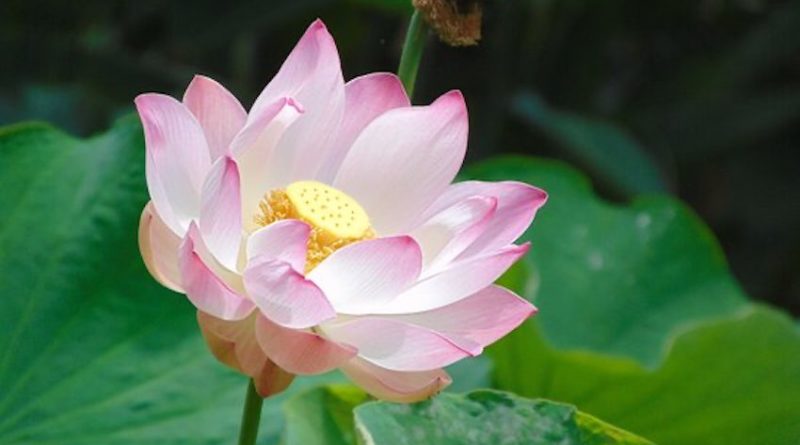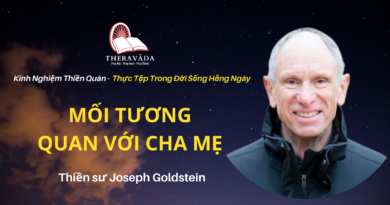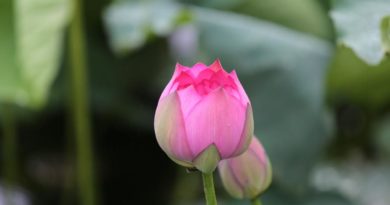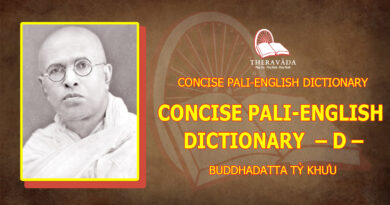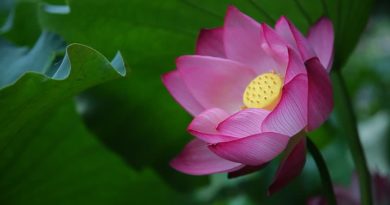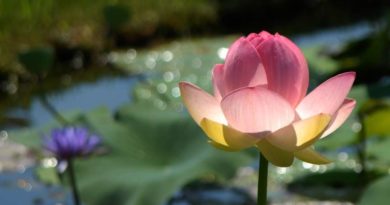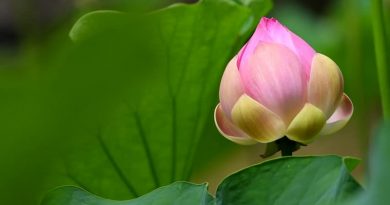The Ordination Procedure & Some Vinaya Rules – 2. Bhikkhu Ordination (eng)
THE ORDINATION PROCEDURE & SOME VINAYA RULES – 2. BHIKKHU ORDINATION
A bhikkhu who is selected as the instructor should lead the ceremony of bhikkhu ordination as follows.
Preceptor
Instructor: The Omniscient Buddha laid down a Vinaya rule that only one who had a preceptor was to be ordained a bhikkhu. Accordingly this applicant shall have a preceptor to ordain him and guide him in the course of his bhikkhu life. So, he will have to take a preceptor.
Please repeat after me, applicant.
“Upajjhayo me bhante hohi” (3 Times): Venerable Sir, please be kind enough to be my preceptor.
Preceptor: Pasadikena sampadehi. Behave well.
Applicant: Ama Bhante.Yes ,Venerable Sir.
N.B. Though an applicant has taken his preceptor in his samanera ordination he should repeat the procedure now.
Indicating the Robes and Bowl
Instructor: Please listen to me, applicant. An applicant must have a set of three robes and one alms-bowl in his possession. I am, therefore, going to indicate your robes and bowl.
This is your own alms-bowl.
This is your own outer robe.
This is your own upper robe.
This is your own inner robe.
Now you are possessed of a complete set of three robes and one alms-bowl. So as to read the Kammavaca conveniently, I am going to give you and your preceptor new names. Your new name is Naga and your preceptor’s is Venerable Tissa. This Assembly of the safigha will use the name Naga for the applicant and Venerable Tissa for the preceptor. These two names will be used throughout the ceremony of this bhikkhu-ordination.
Instruction
Instructor: Please listen to me Naga. Now is the time for me to instruct you on how to answer the questions that will be put to you by the Assembly, regarding disqualifications for bhikkhuhood. However, it is not proper to instruct you in the Assembly, so I will have to instruct you outside the Assembly.
Please stand up Naga and mindfully walk backwards with your palms together in the manner paying respect to the Assembly. Then, you should stop at a place about twenty feet from the Assembly and stand there.
Sunatu me bhante sangho. Nago ayasmato tissassa upasampadapekkho. Yadi sanghassa pattakallam. Aham nagam anusaseyyam.
Let the sangha listen to me. Naga requests ordination from the venerable Tissa. If it is the proper time for sangha, I shall instruct Naga.
[Then the instructor goes to the applicant.]
Instructor: Please listen to me Naga. This is the time for you to tell the truth and the facts. When you are in the Assembly of the sangha you will be asked some questions concerning disqualifications for bhikkhuhood (Full Ordination). You shall answer the truth and the facts. Do not be at a loss; do not be embarrassed. You are just to answer “Yes venerable sir” if it is true, or “No, venerable sir” if it is not. The questions will be as follows:
- Do you suffer from leprosy? If you do, you are to answer, “Yes, Venerable sir”. If you do not, you are to answer, “No, Venerable sir”. (No, Venerable Sir.)
2. Have you got boils? (No, Venerable Sir.)
3. Have you got eczema? (No, Venerable Sir.)
4. Have you got tuberculosis? (No, Venerable Sir.)
5. Have you got epilepsy? (No, Venerable Sir.) - Are you a human being? (Yes, Venerable Sir.)
7. Are you a man? (Yes, Venerable Sir.)
8. Are you a free man? (Yes, Venerable Sir.)
9. Are you free from debt? (Yes, Venerable Sir.)
10. Are you free from government service? (Yes, Venerable Sir.)
[When you are on leave, you can answer “Yes, Venerable sir”.]
- Have your parents permitted you to be ordained a bhikkhu? (Yes, Venerable Sir.)
12. Have you reached the qualifying age of twenty years? (Yes, Venerable sir.)
13. Have you got a complete set of three robes and one alms-bowl? (Yes, Venerable Sir.) - What is your name? (My name is Naga.)
15. What is your preceptor’s name? (My preceptor’s name is Venerable Tissa.)
I have now taught you, Naga, how to answer the questions that will be asked to you when you are in the Assembly. I am now going back to the Assembly alone. You will have to remain here and come to the Assembly only when you are called.
Sunatu me bhante sangho. Nago ayasmato tissassa upasampadapekkho. Anusittho so maya. Yadi sanghassa pattakallam. Nago agaccheyya.
Let the sangha listen to me. Naga requests full ordination from the venerable Tissa. He has been instructed by me. If it is the proper time for the sangha, let Niga come.
Making a Request for Bhikkhu Ordination
Instructor: This is the time for you, Naga, to request the sangha to ordain you a bhikkhu. Your request should be both in Pali and in English.
Naga: Sangham Bhante upasampadam yacami. Ullumpatu mam bhante sangho anukampam upadaya.
(Venerable sirs, I would like to request the sangha to ordain me a bhikkhu. I beg the sangha to raise me from the status of samanera.)
Dutiyampi Sangham bhante upasampadam yacami. Ullumpatu mam bhante sahgho anukampam upadaya.
(For the second time, Venerable sirs, I would like to request the sangha to ordain me a bhikkhu. I beg the sangha to raise me from the status of samanera.)
Tatiyampi sangham bhante upasampadaih yacami. Ullumpatu main bhante sahgho anukampam upadaya.
(For the third time, Venerable sirs, I would like to request the sangha to ordain me a bhikkhu. I beg the sangha to raise me from the status of samanera.)
Sunatu me bhante sangho. Ayam nago ayasmato tissassa upasampadapekkho. Yadi sanghassa pattakallam. Aham nagam antarayike dhamme puccheyyam.
Let the sangha listen to me. Naga wishes full ordination from the venerable Tissa. If it is the proper time for the sangha. May I question Naga on impediments to ordination?
Instructor: Please listen to me Naga. This is the time for you to answer the truth and the facts. Do not be at a loss; do not be embarrassed. On behalf of the sangha I am now going to ask you the questions which examine your disqualifications for the bhikkhuhood. You are just to answer “Yes,Venerable sir”, or “No, Venerable sir”.
– Do you suffer from leprosy?
– (No, Venerable Sir.)
….
[Note: All the questions are as given above. ]
[ Then members of the Assembly read kammavaca systematically. At the end of kammavaca the applicant has become a bhikkhu ( Full Ordination ).]
Anusasana
After the applicant has become a bhikkhu, a senior bhikkhu is to explain the four dependances and the four most important rules of vinaya as follows:
The Four Dependances ( Cattaro Nissaya )
Food: A bhikkhu’s life depends on the food he has collected by going alms-round. So he should consume it and make an effort to practise dhamma. But there are special allowances: They are a community meal, a designated meal, a meal by lot, a meal by invitation, a meal on the days of the waxing and the waning moon, a meal on the observance day and a meal on the day following observance day.
In short he may take any allowable food offered by devotees out of their faith in the Buddha sasana.
Robe: A bhikkhu’s life depends on a dusty robe (pamsukula civara) or a rag-robe which is made of different pieces of cloth thrown away by the people. So he should put it on and make an effort to practise dhamma. But there are special allowances: they are robes made of linen, cotton, silk, wool, hemp or a robe made of different kinds of material.
In short he can put on any allowable robe offered by devotees out of their faith in the Buddha sasana.
Lodging: A bhikkhu’s life depends on the foot of a tree as a lordging. So he should live under the shade of a tree and make an effort to practise dhamma. But there are special allowances: they are a cave, a building with a thatched roof, with the roof on one side, with the roof on both sides, with a pinnacle, without a pinnacle, made of wood, bricks, bamboo etc.
The buildings with the roof of leaves, zinc-sheets, asbestos-sheets, reinforced concrete etc. are also permissible as they are not prohibited.
Medicine: A bhikkhu’s life depends on fermented urine as medicine. So he should take fermented urine as medicine and make an effort to practise dhamma. But there are special allowances: they are ghee, fresh butter, oil, honey and molasses. Having formally accepted them, he is to take them as medicine within seven days at most. On the seventh day he shall give them away. However, he may use them externally after the seventh day.
He can also take any allowable indigenous or Western medicine donated by devotees out of their faith in the Buddha-sasana.
The Four Most Important Rules
Sexual activity: An ordained bhikkhu shall not engage in any type of sexual activity with any female or male being, even an animal. If he does, he is no longer a bhikkhu, not a son of the Buddha of the Sakyan clan. He must be disrobed and cannot be reordained a bhikkhu in this present existence.
Stealing: An ordained bhikkhu shall not steal or take what is not given, even a piece of grass or split of bamboo. If he does, he is no longer a bhikkhu, not a son of the Buddha of the Sakyan clan. He must be disrobed and cannot be reordained a bhikkhu in this present existence.
Killing: An ordained bhikkhu shall not intentionally kill a living being, even a white, red or black ant. If he kills an animal, even an insect, he has a Pacittiya offence. If he kills a human being, even if he gives any kind of medicine for abortion, he is no longer a bhikkhu, not a son of the Buddha of the Sakyan clan. He must be disrobed and cannot be reordained a bhikkhu in this present existence.
False Claim :An ordained bhikkhu shall not falsely claim to attain superhuman attainments such as Jhana (absorption concentration), Magga (Path knowledge), and Phala (Fruition knowledge); he shall not even say that he takes delight in a quiet place. If he, having evil desire, falsely claim to have any of superhuman attainment such as Jhana, he is no longer a bhikkhu, not a son of the Buddha of the Sakyan clan. He must be disrobed and cannot be reordained a bhikkhu in this present existence.
[Then the fresher bhikkhu requests the sangha to exempt him from monastic duties as follows. ]
Making a request to be free from duties
Venerable sir, I would like to request you to exempt me from my monastic duties to you in order that I may meditate very well. I, too, make you free from your monastic duties to me. (3 times)

